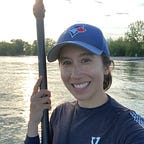How I overcame my inner critic and found the joy of being on board
Here’s somewhere I never thought I’d be; carving the skatepark banks at the age of forty. But that’s where I’ve found myself these past few months, bike helmet and padding securely in place, pushing and gliding on a borrowed board, dodging the kids on scooters and teens on skateboards. It seems like an odd place for me to be, and it doesn’t always feel natural (hello imposter syndrome!) but somehow, it works and it’s hella fun!
This past summer, frustrated with a lack of progress with my surfing, I decided to take my skills to the next level. I’d been hanging out for too long in the advanced-beginner/low-intermediate category. I’m a lake surfer and SUP surfer, and the inconsistent swell of the Great Lakes doesn’t help, especially in the flatter spring and summer months. I’ve been told by many surfers that surfskating, a variation of skateboarding that mimics the motions of surfing on a board designed for this purpose, was great on-land training. I was both reluctant and skeptical. Skateboarding wasn’t something I was drawn to; I never did it as a kid and have been on a skateboard twice as an adult. Plus I didn’t see the connection to surf; I just saw the potential for me to wipe out on concrete, a hit to both my ego and body.
However, I was presented with the opportunity to take some free surfskating classes and decided to keep an open mind. The first few lessons, I was tentative and the slowest, oldest person in the group. As someone who is naturally athletic, I wasn’t digging the not-getting-it part. Plus I had that nagging voice in my head that was wondering what exactly a forty year-old was doing on a skateboard. But I pushed past the inner critic and persisted. I let myself be ok with not being the best and took a humble backseat to my more advanced classmates as I slowly progressed with each lesson. And I’m so glad I did! There is a wonderful, fluid motion to surfskate that feels like a dance. It’s like skateboarding for adults, with the need for finesse and flow, a contrast to traditional skateboards that scrape the pavement and land with a bang. And the connection to surfing is most definitely there. Carving the park banks is like carving a concrete wave, with similar movements you’d use to turn and generate speed on a surfboard. I now skate regularly and find myself craving it if it’s been awhile.
If you are reading this and are thinking, hey, I’m an adult and I’d like to learn how to surfskate, here are a few absolute beginner suggestions for you. And really, these recommendations can be applied to most other sports too, whether you’ve always wanted to learn to ride a bike or are curious to try skiing.
Pay for Some Professional Lessons
The difference between learning as a kid and learning later in life is that you are now a grown-ass adult and probably do not have the time or desire to play around on a board until you figure it out or learn via random YouTube tutorials. That’s fine; take your hard-earned dollars and pay a professional to teach you the tricks of the trade. It will make the learning process a whole lot easier, quicker, and much less embarrassing. Also, lessons usually come with rented gear, so you can try it out and decide if this is for you.
Get The Right Gear
If after your lesson(s) you decide that yes, this is something you’d like to do more of, head to one of the rad speciality shops (surf and skateboard shops both carry skatesurf gear) who can offer you guidance in selecting your board and safety gear. Get over the feeling that you don’t belong. Trust me; the independent shops appreciate your business and have way more knowledge than anyone at the big box stores. Get a helmet and the pads to protect your vulnerable wrists, elbows and knees. Having that layer of protection is what responsible adults do, and will give you peace of mind and provide an extra layer of bravery.
Find Your Crew
Nothing is a stronger motivator than having a group of like-minded people you can skate with. There are various communities of cool people of all ages who skate. My hometown of Toronto is fortunate to have some awesome skate-based groups that cater to people who don’t fall under the usual suspects of young, white males. Babes Brigade is a POC owned company that aims to empower girls and womxn+ through skateboarding, offering lessons and hosting events (they even cast skaters for film and television). The Later Skaters Gang, made up of “skaters that took up/keep skating later on in life,”gather and skate via meetups and skate nights, and post footage on their Instagram if you need inspiration.
Get Out of Your Head
Finally, don’t listen to the critics, especially the one coming from within. That’s the thing about learning as an adult; even if you have the time and resources, you have to get past that mental block that tells us learning a new skill, especially activities not typically geared towards the over-thirty crowd, is for the young. Forget about what you think you look like. Tear down the social constructs of what someone your age should and should not do. In letting go of conformity and that desire for acceptance, comes the newfound space for the freedom to try new things and doing whatever might bring you joy.
